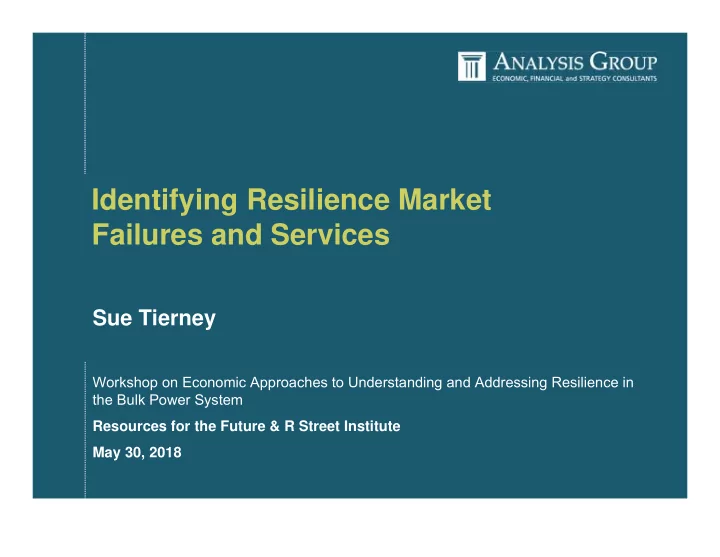

Identifying Resilience Market Failures and Services Sue Tierney Workshop on Economic Approaches to Understanding and Addressing Resilience in the Bulk Power System Resources for the Future & R Street Institute May 30, 2018
Resilience Workshop – May 30, 2018 My point of view (biases) Resilience = A combination of activities Not the same as “reliability” More than just generation or bulk power system Bigger than FERC’s jurisdiction Resources for the Future and R Street Institute Page 2
Resilience Workshop – May 30, 2018 re·sil·ience r əˈ zily ə ns/ noun “the power or ability to return to the original form, position, etc. after being bent, compressed, or stretched . . .. . . [to] spring back, rebound.” Random House “…bent, compressed, or stretched….” as a result of: human-induced actions or events (cyber, terror, sabotage, human error) natural events (e.g., extreme weather or other climate-related occurrences (fires, floods, droughts), earthquakes, volcanoes, tsunami) Resources for the Future and R Street Institute Page 3
Resilience Workshop – May 30, 2018 re·sil·ience r əˈ zily ə ns/ noun Incident-Focused A resilient system is one that: acknowledges that outages can occur PRIOR prepares to deal with them PRIOR minimizes their impact when they occur DURING is able to restore service quickly AFTER draws lessons from the experience to Post Incident improve performance in the future. Learning Resources for the Future and R Street Institute Page 4
Resilience Workshop – May 30, 2018 Electric system resilience is more than: Generation assets and attributes Bulk power system FERC jurisdiction The electric system alone Commodity products or services Resources for the Future and R Street Institute Page 5
Resilience Workshop – May 30, 2018 Electric system resilience = a combination of…. Products and services – e.g., commodities Energy Capacity (resource adequacy and more) MW sufficient to meet peak and installed reserves MW sufficient to provide energy when called upon (e.g., fuel assurance) MW capable to perform particular services (e.g., black start) Ancillary services (operational security) Principles for provisions of these products & services: Rely on markets or market-based approaches wherever possible, practical Resources for the Future and R Street Institute Page 6
Resilience Workshop – May 30, 2018 Electric system resilience = a combination of…. Systems and processes - i.e., not commodities Planning e.g., risk identification, modeling and analysis, drills and exercises, mutual assistance agreements in place, location of critical services, inventory of equipment, spare parts, inter-sectoral coordination Event-management services and capabilities e.g., communications, graceful degradation, mutual aid Restoration process and protocols e.g., sequencing of system elements, logistics/staging Evaluation e.g., metrics, assessments, standard-setting, willingness to pay These are more like monopoly services, public goods, establishment of the rules of engagement, avoidance of negative externalities Resources for the Future and R Street Institute Page 7
Resilience Workshop – May 30, 2018 Electric system resilience = a combination of Products and services: Regulators and agents (RTO, utility) should: Define the product/service, then rely on markets to provide them efficiently and effectively Markets may include bid-based/auctions as well as centralized/decentralized competitive procurements Systems and processes: Regulators should: Define elements (e.g., planning) and set standards of performance (e.g., metrics, check list) Provide financial incentives and standard ratemaking elements for provision of these system elements and processes Resources for the Future and R Street Institute Page 8
Resilience Workshop – May 30, 2018 A few other thoughts New policy (legislative and/or regulatory)? To characterize resilience and establish expectations for performance (who, what, when, where, why, how) To fill the gaps in jurisdiction e.g., FERC vis-à-vis some issues and some system: gas- system reliability rules and standards, coordination across bulk-power and distribution networks To address public policy considerations e.g., due discrimination in restoration priorities, such as providing service first to critical infrastructure and services; information requirements for distributed energy systems capable of supporting resilience Resources for the Future and R Street Institute Page 9
Resilience Workshop – May 30, 2018 A few other thoughts (continued) New product/service definitions needed? Redefine “resource adequacy” to make it more robust e.g., locational, temporal, operational attributes Metrics and standards? e.g., planning standards (N-2; multi-system failure; fuel- assurance); performance standards; ratemaking best practices and incentives Resources for the Future and R Street Institute Page 10
Resilience Workshop – May 30, 2018 Sue Tierney 617-425-8114 stierney@analysisgroup.com Resources for the Future and R Street Institute Page 11
Recommend
More recommend